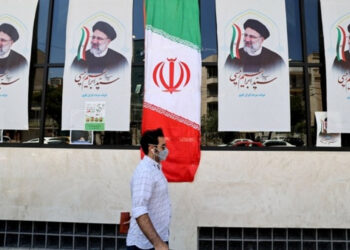President Donald J. Trump promised to “rip up” the Iran nuclear deal (“the worst deal ever”) on his first day in office. 260 days have passed.
Nothing is more embarrassing to President Trump than having to certify Iran’s compliance with the nuclear agreement in every 90 days. His national security team, including Defense Secretary James Mattis, cautioned against abandoning the deal. Despite the pleas, Mr. Trump is expected to de-certify the nuclear deal for violating the “spirit of the agreement” and leave the decision up to the Congress to re-impose sanctions.
The president’s anticipated decision to de-certify the deal has struck a disquieting chord among his national security team. But de-certifying the agreement is an internal matter. It doesn’t mean that the deal will be killed. U.S. Congress may decide not to re-impose sanctions, an unlikely outcome that will salvage the deal. But it’s remarkable how America’s top generals are on a mission to save the nuclear deal.
Mr. Trump tied his hands when he passionately campaigned against it as “the worst deal ever.” He rallied against the deal so vociferously that it is now impossible for the president to certify it in every 90 days without looking bad. The smartest move will be to refer the case to the Congress. Even if the Congress extends sanctions relief, Mr. Trump will save face among his conservative base.
Ending the Iranian nuclear deal was one of the central foreign policy promises because it allegedly posed a mortal threat to Israel and unfairly empowered Iran. Denouncing Iran also still has an enduring appeal among GOP’s conservative base. As a candidate who campaigned on an idea that Washington is a junkyard of broken promises by corrupt politicians, Mr. Trump can’t afford to break his pledge.
America’s confrontation with Iran has never been about its nuclear ambitions. It’s been about its expansionist policies in the region. Iran has always been a bad boy America never liked since 1979. Since then, the U.S. supported Iraq in its 8-year war against Iran. In 1990s, the U.S. imposed doomed dual containment policy against both Iraq and Iran.
Even without a nuclear program, Tehran has always been on Washington’s blacklist. Its nuclear program just made it easier for the U.S. to rally international coalition against Tehran. Washington could now bring up non-proliferation principle to frame Iran as a rogue state in violation of international treaties. It was never about nukes, but it proved very useful.
The U.S. and the E.U. imposed crippling sanctions against Iran because it was allegedly on its way to becoming a nuclear state. But when negotiations had started, it solely focused on the country’s nuclear intentions. If Iran shipped its enriched uranium out of the country and halt its program, then sanctions would be lifted. To save its limping economy, it was a deal that Tehran was ready to accept. Sanctions that were intended to weaken Iran now became a means to end its nuclear program. Sanctions relief was linked to Iran’s nuclear program — a condition that Republicans rejected.
After the deal was signed, Western sanctions were lifted. Iran now had more financial power, which it could always translate into a military muscle. Lifting sanctions opened billions of dollars of investment from E.U. countries into Iran. Tehran could now easily project power in the region with its proxy groups. Sanctions relief in exchange for routine intrusive inspections was an immense gift.
The Republicans repeatedly warned the Obama administration that the nuclear deal was not fair because it would only empower Iran. Cutting its nuclear capability, Republicans argued, was also only for ten years (Now eight). With stronger economy and military, Iran will be even more unstoppable if it decides to go nuclear in ten years.
Democrats argued that Washington would deal with Iran’s destabilizing activities in the region as a separate matter. They argued that a state sponsoring terrorism was better than the state sponsoring terrorism with a nuclear capability.
If the U.S. ends the deal unilaterally and imposes sanctions on Iran, Washington may not be as successful in building a coalition as it did during the sanctions regime. It will put American credibility on the line and may make it difficult for the U.S. to negotiate similar deals in the future with countries like North Korea.
There are also increasing calls in Washington that the deal should instead be re-negotiated. Scrapping the nuclear deadline and a ban on testing ballistic and cruise missiles are among the main demands. It is not clear if Iran will ever agree to sit down to re-negotiate, let alone accept these points. Iran said it would only re-negotiate the deal if the U.S. also makes compromises on points that Iran deems unfair. Opening up every deal to renegotiations, from NAFTA to the nuclear agreement, will hurt U.S. ability to strike long-term deals with other countries.
Adding to the pressure on the Trump administration is a mounting concern by Sunni nations in the Gulf and Israel that Iran is expanding its powers in the region. The Shiite country’s influence in Iraq, Syria, and Lebanon has been growing since the nuclear deal. Just a week after the U.S. extended sanctions relief last month, it test-fired a ballistic missile that is capable of reaching Israel, Saudi Arabia, and eastern Europe. Anxious Gulf states even imposed a blockade on U.S. ally Qatar for its close ties with their arch-foe.
Providing a relief to Iran just because it curbed its nuclear program runs contrary to a longstanding U.S. policy of containment. Its nuclear program, according to hawks, only reinforced worries that it was a rogue nation. It was never the primary concern.
Even if the nuclear deal remains intact for some years, incessant U.S. pressure will ultimately end whatever agreement both nations had. Because it was never about the nukes.
Disclaimer: The views and opinions expressed here are those of the author and do not necessarily reflect the editorial position of The Globe Post.





















